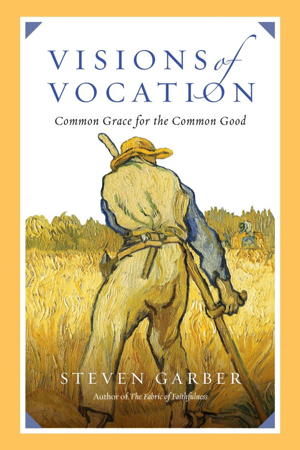
How do you develop a deeply formed Christian way of fundamentally understanding the paradigms of your discipline? In Visions of Vocation: Common Grace for the Common Good Dr. Garber teaches us that “the stuff of our work” matters to God and that our work is integral to God’s purposes in the world.
Dr. Steven Garber was the Principal of the Washington Institute of Faith, Vocation and Culture in Washington, DC for several years and is now Professor of Marketplace Theology and Leadership at Regent College Vancouver.
Chapter One
- Do you feel that you have compelling and sustainable reasons to care about your work and our world?
- What is your reaction to Steve Garber’s idea that vocation is integral rather than incidental to the Missio Dei?
- Garber discusses Simone Weil and the idea of paying attention. What is your experience with learning to distinguish what really matters from what doesn’t really matter?
- What are the challenges within your own profession?
Chapter Two
- Do you have a defining experience that has impacted how you have thought about and done vocation since?
- To what extent is the separation of competence from character normalized in your workplace?
- Are there systemic injustices that have crept into our disciplines?
Chapter Three
- Do we have personal technology habits we are dependent on now — ones that we didn’t have 5-10 years ago?
- What are ways in which we can unplug ourselves from the 24/7 info glut?
- What do you think about the idea that our brains are being rewired? That we have less ability to concentrate and read with discernment? (page 65)
- How do you react to the idea that we are deeply moved all the time (by overexposure to stark reality), so that we learn to protect ourselves and move on? (pages 63-64)
- What is your experience of having a place at the table where no perspective has moral weight? (page 71)
- How do you respond to the idea of being fragmented people with no coherent sense of identity? (Garber’s image is of playing on different teams, not sure which one we really belong to.)
Chapter Four
- What are your thoughts on the idea that we really know only to the extent that we do? (i.e. we need to translate the right things we know to right practices) (pages 85-87)
- What are some ideas and places you are responsible for? Are there ways you can translate knowing into doing?
Chapter Five
- Who are the people and places God wants you to be responsible for?
- How can we make better choices for the sake of the people and places God wants us to be responsible for rather than being satisfied with just good choices? Consider the good and better choice that the two old men made in Tolstoy’s story.
- Which of Jesus’ interactions with people in the gospel of John resonated most with you? Why?
- How do the metrics and assumptions of your field or discipline measure against the greater economy of the Kingdom of God? “Are they true to the world that is really there?”
Chapter Six
- If you’ve been impacted by friends or mentors who’ve intentionally pursued their callings in how they steward their work, share one such story.
- Share a story of how you’ve been intentionally integrating your faith into your work — and your joys and struggles in the process. If you have been struggling to integrate your faith to your work, what are some new ideas you could try?
- Knowing the complexity of our broken world, what few responsibilities is God calling you to be faithful to day in and day out?
Chapter Seven
- Living with what is and longing for what will be, how might you be a hint of hope? How does the Christian worldview impact how you engage in your work? (e.g. like George the Banker)
- To what extent might we resonate with feeling the weight of working on something others don’t care about or trying to do the right thing and feeling the indifference of others?
- What are some ordinary or unremarkable ways that we impact the particular people and places God has given us — the ones that would only be noticed if we wouldn’t do them?
Chapter Eight
- When what you hoped for did not happen, how did you find honest happiness within the new choices you made?
- What are ways we can work for some proximate justice within the institutions and structures that we are a part of? (e.g. like the IJM woman who worked to rescue 100 children from bonded labor in India despite there still being other children in the same situation today). How can we contribute to the flourishing of our nation/state/sector/discipline/university?
We'd love to hear more about your book club! Let us know if you are using this guide — we'd love to pray for your meetings!